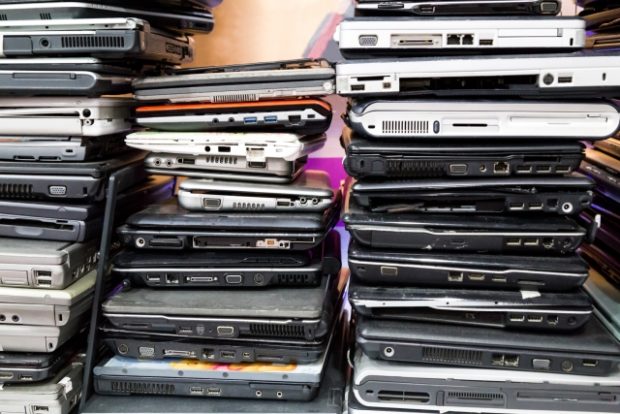
Instead of sitting idle, unused IT hardware could be repurposed or, if necessary, recycled. Image: IStock/ThamKC via AFP Relaxnews.
The European Week for Waste Reduction (EWWR), running Nov. 21 to 29, 2020, aims to raise public awareness about sustainable resource and waste management. For the occasion, France’s Environment and Energy Management Agency (ADEME) reminds us of the three golden rules for dealing with digital waste: reduce, reuse and recycle.
Reduce
Good waste management starts with reducing the amount of raw materials in use, limiting the environmental damage that sourcing them can cause. Digital devices contain an array of rare earth minerals, essential to their operation, which are notably found in the batteries of smartphones and laptops.
By reducing usage, lifespans can be prolonged. It is therefore preferable to extend the lifespan of existing products rather than systematically replacing them with new ones. If you do have to buy a replacement, think about donating or selling old devices to ensure they have the longest possible lifespans.
Reuse
The second golden rule is to reuse products, either by passing on devices to others or by buying secondhand. Many outlets currently recondition high-tech devices, giving them a new lease of life.
The advantage of a secondhand product is that it can have similar tech specs to a new device, with some new replacement parts where necessary, while selling at a lower price. All in all, refurbished products can be beneficial to consumers and to the environment.
Recycle
Finally, try to recycle electronic devices that reach the end of their life, recovering usable components to put back into production lines, rather than leaving them to clog up your home — or worse, the world’s rubbish dumps.
Most major players in the high-tech world now play an active role in, or initiate their own mass recycling schemes. Apple and Orange, for example, have already committed to taking back old devices for recycling. CC
RELATED STORIES:
Quarantine life offsets gains in drive vs plastic waste
PPE waste disposal a growing challenge